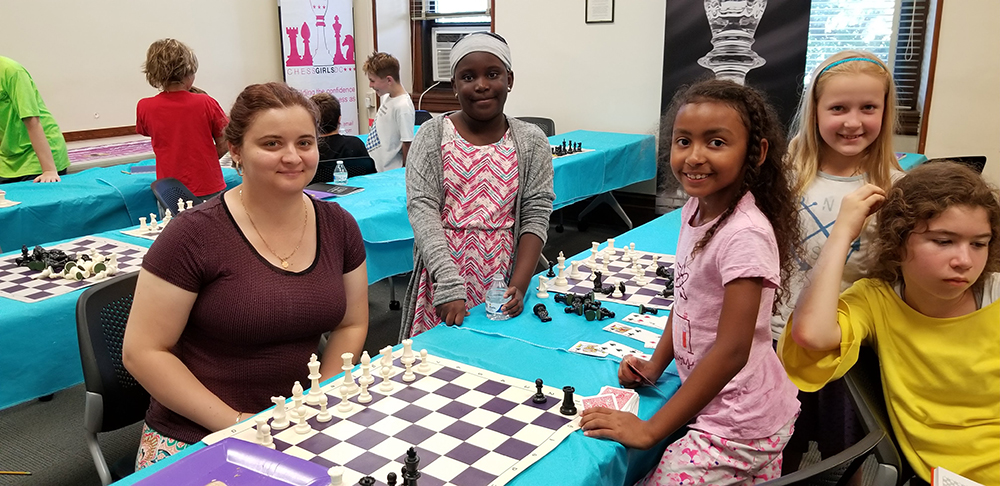
Chess Girls DC
Woman Grandmaster Sabina-Francesca Foisor (left) visits Chess Girls DC. The organization brings female leaders and coaches to visit the girls as part of its goal to teach confidence, leadership and critical thinking.
Robin Ramson was a chess player in high school, and she introduced the game to her daughter, Sarah, when she was 4.
“I started teaching it as a way [for her] to learn to focus,” Ramson said.
But Ramson couldn’t find other girls for Sarah to play with.
So five years ago, in a back room of B’s Cafe in the Brookland area of Washington, DC. Ramson started a chess club with five young girls.
The restaurant is closed now, but the nonprofit Chess Girls DC is going strong. It hosts an annual all-girl tournament that is expected to draw 60 girls in grades K-12 to Washington this year.
The club, with 30 registered members, meets on Saturday afternoons in a classroom at Catholic University in Washington.
“It’s a space where girls can come and meet other girls who play chess,” Ramson said.
Chess is popular in Northern Virginia and Maryland but no one is focusing on girls’ chess clubs, she said. Chess Girls DC makes a point of drawing girls from underrepresented minority groups and families with limited resources.
Far more boys than girls compete in chess. Among elementary school children, only one girl for every four boys plays in tournaments, according to the New Yorker. At the high school level, only one girl for every 10 boys participates, according to the magazine.
Why chess?
Chess teaches important thinking skills, Ramson believes. It’s also seen as a path into science and math fields.
“A lot of it is memorizing patterns,” she said. It develops cause-and-effect thinking and long-term planning, she said. Players reason: “If I do this, here are all the possibilities.”
STEM fields all require focused learning, Ramson said. They involve reasoning “if this happens, then this happens.”
A game in which children play adults
To the uninitiated, one startling aspect of chess is that a child may be qualified to compete with an adult.
“Chess is like an equalizer,” Ramson said. Second- and third-graders may be rated as highly as adults.
While the game helps girls develop confidence, “in most classrooms the boys just overshadow the girls” with their aggressive chess playing, Ramson said.
When girls seem to be losing interest in the game, she fights back with color. She bought her daughter a pink chessboard, for example.
“We have a lot of purple and pink” in the club, she said.
Girls from six states will be attending the October Girls Mid Atlantic Regional Tournament sponsored by Chess Girls DC on Oct. 20 in Washington. Tournament winners will get free registration to the 2019 Chicago All Girls Nationals Tournament.
Although most of the girls in Chess Girls DC are younger than high school age, Ramson sees big benefits for high school girls. Adolescents can be buffeted by emotion, she said. Chess provides a quiet space. It grounds them, she said.
“It helps them learn to make decisions based on what the facts are,” she said. “In chess, you learn to hone your thinking and focusing.”





























